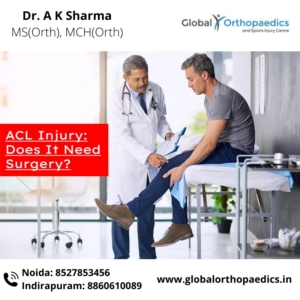If your ACL has been damaged, you may be concerned that you may require surgery. The great news is that not all ACL tears need surgical treatment. It is helpful to understand what is happening inside your knee.

The ACL(anterior cruciate ligament) is a major knee ligament. It is a ligament that joins your femur (thigh bone) to your tibia (shin bone) (tibia). A strong ACL is essential for optimal knee joint motion. If you are looking for an ACL surgery center in Delhi NCR, then you are in the right spot!
How can you tell if your ACL has been injured? Common signs of an ACL injury include:
- Crackling sound at the time of injury
- Knee joint swelling
- Redness and heat around the knee
- flexion of the knee
- Walking, running, and exercising is difficult
- discomfort in and around the knee
Types of ACL injuries
ACL tears can be either total or partial. Complete ACL injuries almost often require surgery, although partial ACL tears can be adequately repaired without surgery.
ACL tears are classified as sprains based on their severity (a sprain is a stretch or tear in a ligament). An ACL sprain of grade 1 occurs when the ligament is overstretched but not ruptured. If your knee is still stable, you have probably sustained a grade 1 injury and may not require surgery.
An ACL sprain of grade 2 is a partial injury. If you have a grade two sprain, your ligament is likely to be compromised, and you will likely have instability. Partial ACL tears, or grade 2, are the least prevalent of the three forms.
ACL sprains of grade 3 are full tears. A total ACL rupture is exceedingly detrimental to the knee and nearly usually necessitates surgery and a lengthy period of recovery. If you sustained an ACL injury of grade 3, you likely experienced considerable knee discomfort and instability.
ACL injury treatment options
Rest, ice, compression, and elevation should be the initial course of therapy for ACL damage shortly after the injury occurs. Dr. Drew evaluates if surgery is necessary based on knee instability. If your knee is unstable, surgical intervention is typically advised. If your knee is stable, you may be able to avoid surgery.
Other determining factors include:
- If you should return to sports or other activities requiring pivoting or angular motions, ACL repair surgery is typically suggested. If you do not need to return to these activities, the joint may usually be stabilized and strengthened with the help of physical therapy.
- Your degree of discomfort is a crucial factor in determining whether or not surgery is required. Even grade 2 ACL injuries may require surgery if the pain is severe.
- If you have a partial tear and have a reasonably sedentary lifestyle, you may not need reconstructive surgery.
- If your growth plates are still open (this only applies to youngsters), you may not need surgery for a partial rip.
Managing your ACL tear
Regardless of the severity of your ACL sprain, it is imperative to get medical attention promptly if you have an ACL injury. Dr. A K Sharma will assess your injuries and recommend the optimal course of therapy, and he is the best ACL surgeon in Noida.


